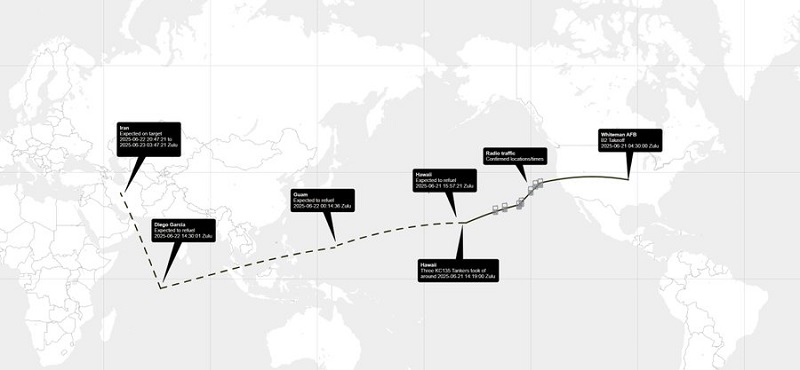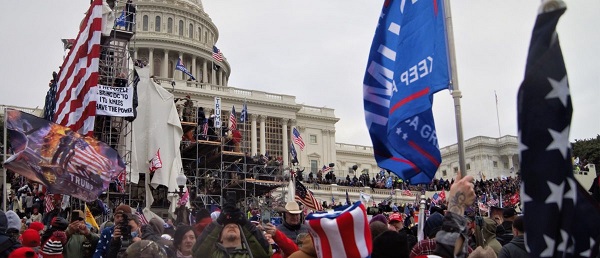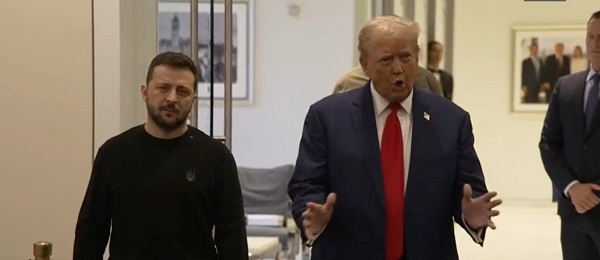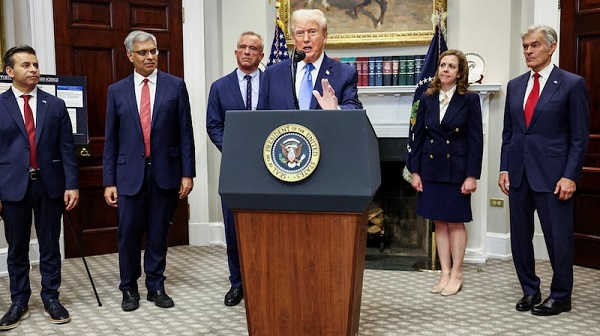International
Trump’s Strike on Iran Reshapes Global Power Balance, Deals First Blow to Beijing and CRINK Axis

Some analysts say the U.S. strike marks the West’s first major blow in an emerging global war against the ‘CRINK’ alliance — China, Russia, Iran, and North Korea.
At 8:00 p.m. on Saturday, President Donald Trump confirmed that U.S. B-2 stealth bombers had penetrated Iranian airspace overnight and delivered precision strikes on multiple nuclear enrichment facilities—marking the first direct American military action targeting Iran’s nuclear program since the conflict with Israel escalated.
Trump said the strikes were “massive” and necessary to prevent the world’s most dangerous regime from acquiring the world’s most dangerous weapons.
The United States and its military had completed a strike unprecedented in history and that no other military can achieve, Trump declared in a televised address from the Oval Office, arguing that Iran had sought the destruction of Israel and America, and killed many U.S. soldiers.
The president’s remarks confirmed what international observers and Israeli defense officials had begun to piece together in the early hours of Saturday in the Middle East: that American forces had joined Israel’s rapidly expanding campaign to dismantle the Islamic Republic’s nuclear and military infrastructure—a move with historic ramifications for the balance of power in the region and for global security.
This attack, while narrowly focused on nuclear targets, may mark a broader inflection point in the strategic landscape of what some U.S. defense analysts call the “CRINK” war—referring to the de facto alliance of China, Russia, Iran, and North Korea.
This morning Mike Gallagher, the former chairman of the House Select Committee on the Chinese Communist Party and now a national security adviser, said the strike marked a return to credible power projection.
“Deterrence comes from dominant force and the willingness to use it,” he posted to X. “Last night, President Trump took a critical step toward restoring deterrence in the Middle East and around the world.”
According to senior U.S. defense officials, the strikes involved a small number of stealth bombers supported by aerial refueling tankers and surveillance aircraft operating from bases in the Middle East and Europe. The targets included Iran’s deeply buried Natanz uranium enrichment complex and secondary facilities near Arak and Fordow.
Of these, Fordow is considered Iran’s most fortified nuclear site—tunneled into a mountainside near the holy city of Qom and designed to survive conventional airstrikes. Reaching it requires specialized bunker-penetrating munitions. Only the United States possesses weapons capable of striking such hardened targets: most likely the GBU-57 Massive Ordnance Penetrator, a 30,000-pound bomb built to bore through hundreds of feet of reinforced rock and concrete. Defense sources say multiple sequential detonations would be required to break through the mountain’s layers and disable the underground enrichment halls.
Early satellite imagery and Iranian state media appeared to corroborate the targeting of Natanz, reporting heavy damage and widespread power disruptions across the site and adjacent military compounds. Iran’s Islamic Revolutionary Guard Corps issued a statement vowing retaliation but acknowledged that “enemy aircraft penetrated undetected and struck sensitive infrastructure.”
The United States, by committing its own strategic assets to destroy critical Iranian military infrastructure, has gained the initiative in what could be seen as the first true strategic victory for the West in World War III—a long, undeclared conflict characterized by economic warfare, proxy combat, gray-zone cyber operations, and regional insurgencies. The Pentagon and White House now face critical choices that could significantly shape the remainder of this century.
The strike could come at a high cost, but also could deliver epoch-shifting, decisive strategic benefits. Iran supplies drones to Russia, subsidizes oil to China, and provides weapons to terrorist actors that threaten U.S. bases and allies from the Gulf to the Mediterranean, military and intelligence analysts argue. Its defeat would damage the CRINK axis, remove a key enabler of great power revisionism, and restore American leverage after years of attritional conflict.
Trump’s language Saturday night suggested he may favor such a path.
In Jerusalem, Israeli Prime Minister Benjamin Netanyahu praised the American action as “a decisive blow against the terror regime in Tehran.” In a national address hours after the U.S. confirmation, Netanyahu said, “This is not just Israel’s fight—the free world has acted.”
Israeli media reported that the Israeli Air Force had provided electronic warfare support and real-time intelligence for the U.S. strikes, though officials declined to confirm operational details. In Tel Aviv, civilians remained under heightened alert, but there were signs of cautious optimism. “The alliance between Israel and the United States is at full strength,” one senior Israeli official told local media. “We have shifted the strategic calculus in the region.”
Iran’s Supreme National Security Council convened an emergency session overnight. Government officials condemned the strikes as an act of war and said Tehran would respond “at a time and place of our choosing.” As of Sunday morning EST, no immediate missile launches had been detected. However, Western intelligence agencies were monitoring known Iranian proxy forces in Lebanon, Iraq, Syria, and Yemen for signs of mobilization.
On Iranian social media channels, state-linked accounts circulated images of damaged facilities alongside calls for retaliatory “martyrdom operations” against U.S. and Israeli targets.
The joint U.S.-Israeli operation followed weeks of escalating hostilities, beginning with Israeli airstrikes deep inside Iranian territory that disabled radar arrays, weapons depots, and drone launch sites. Iranian retaliation—including missile and drone attacks on Israeli cities—prompted increasingly urgent warnings from Western capitals that the situation risked spiraling into open regional war.
In Tehran, BBC correspondents reported a rare mix of panic and defiance among civilians. Some feared a full-scale war was imminent. Others expressed anger at their government for failing to protect key military and nuclear assets.
European leaders called for restraint. In an interview late Saturday night EST, German Chancellor Friedrich Merz described the strike as “a painful but necessary step.” French officials warned of “a dangerous path toward uncontrollable conflict.”
In Washington, current and former intelligence officials said the operation signaled a fundamental shift in U.S. posture.
The Pentagon later confirmed the deployment of additional U.S. forces to the region, including carrier strike groups and long-range missile defense batteries.
Whether the operation succeeds in deterring Iran from restarting its nuclear weapons program—or sparks a wider war in the Middle East—remains uncertain. What is clear is that the seismic shift beneath Fordow began in Iran, but its aftershocks are now reverberating through the war rooms of Beijing and Moscow.
Editor’s Note: The first version of this story was updated to paraphrase President Trump’s remarks, and add a comment from former senator and CCP committee leader Mike Gallagher.
The Bureau is a reader-supported publication.
To receive new posts and support my work, consider becoming a free or paid subscriber.
Invite your friends and earn rewards
Daily Caller
FBI Deployed Nearly 300 Agents On Jan 6 As ‘Pawns In A Political War’


From the Daily Caller News Foundation
The Federal Bureau of Investigation (FBI) deployed a significant number of agents to the U.S. Capitol on Jan. 6, 2021, many of whom later complained that the bureau was driven by political bias, according to an after-action report obtained by Just The News.
The 50-page document shows the FBI sent agents to the Capitol during the riot, including inside the building, without clear instructions, Just The News reported on Thursday. The report, located by FBI Director Kash Patel’s team, was recently turned over to the House Judiciary Committee’s special subcommittee investigating the incident, according to the outlet.
In anonymous assessments submitted after the Jan. 6 attack, rank-and-file employees accused the bureau, under former Directors James Comey and Chris Wray, of being influenced by politics.
Dear Readers:
As a nonprofit, we are dependent on the generosity of our readers.
Please consider making a small donation of any amount here.
Thank you!
“We are supposed to call balls and strikes, regardless of political pressure, now we can’t even be trusted to be on the field,” another employee wrote.
The report disclosed for the first time that the FBI had a total of 274 agents deployed to the Capitol after violence erupted. Wray, who preceded Patel as FBI director, declined to tell Congress how many, if any, agents were on the ground at the time, according to Just The News.
Many of the complaints came from agents within the bureau’s Washington field office (WFO).
“WFO is a hopelessly broken office that’s more concerned about wearing masks and recruiting preferred racial/sexual groups than catching actual bad guys,” one employee wrote.
Agents also described being thrown into the chaos with no clear instructions, no protective gear and no way to identify themselves to other law enforcement officers.
“I wish you all would pay more attention to our safety than what type of masks we wear. If you are going to deploy us to a riot situation, then give us the proper damn safety equipment–helmet, face shield, protective clothing–and training!” one employee wrote.
Other agents blasted what they called a blatant double standard between Jan. 6 prosecutions and the less aggressive approach to the Black Lives Matter riots in 2020.
“The actions on January 6, 2021 were absolutely despicable and unacceptable in a civilized society. What is even more unacceptable was the hypocrisy displayed by the FBI and its leadership in their attempt to go after those involved in the Capitol Riots, while we as agents, watched cities burn across America during the summer of 2020,” one agent said.
“The conspiracy to commit crimes at the Capitol on January 6th, were also committed by bad actors during the summer riots of 2020 leading up to the election on November 3, 2020. Agents stood by on the ground in Washington, D.C. and observed stores being looted, burned, and ripped of anything of value,” the agent wrote.
While the FBI declined the Daily Caller News Foundation’s request for comment, Patel posted on X Friday that the bureau is “continuing to deliver on our promise of ultra transparency.”
“The only reason you have answers is because we are finding and producing materials exposing corruption at record levels. Thank you to the men and women @FBI once again delivering for the American people,” Patel wrote. “No one else is on Mission like we are.”
The after-action report also highlighted growing frustration with the U.S. Attorney’s Office in Washington, which one agent accused of pushing politically motivated cases.
“Currently, the US Attorneys office is dictating what it is that gets investigated. This is a dangerous precedent because we can barely get them to prosecute investigations that clearly meet thresholds needed for Federal prosecutions,” one agent wrote. “However, their willingness to conduct a search warrant on someone’s life for a misdemeanor seems ridiculous. It is unreasonable for the FBI to conduct investigations involving misdemeanor violations at a federal level … it is not our role.”
On his first day in office, President Donald Trump issued over 1,500 “full, complete and unconditional” pardons to people who were involved in the Capitol riot. The action fulfilled a long-standing promise made by Trump during the 2024 campaign.
Daily Caller
Trump’s Apparent About-Face On Ukraine May Not Be The Change It Seems, Experts Say


From the Daily Caller News Foundation
President Donald Trump’s apparent change in tune towards Ukraine shouldn’t be taken solely at face value, and may actually serve another purpose to further pressure all parties to come to the table, foreign policy experts told the Daily Caller News Foundation.
Trump issued a Truth Social post Tuesday saying that Ukraine was “in a position to fight and WIN all of Ukraine back in its original form,” and that he would continue sending NATO weapons to use in Ukraine. While many in the mainstream media characterized his statement as a notable “pivot,” experts told the DCNF that Trump may be giving Ukraine and Russian President Vladimir Putin one last chance to end the war on peaceful terms, after which Trump may stand strongly behind Ukraine or wash his hands of the conflict altogether.
“I think it’s a tactical shift, but I don’t think his strategic purpose has changed,” George Beebe, director of grand strategy at the Quincy Institute for Responsible Statecraft, told the DCNF. There are parties that insist that it must be a battlefield victory, and there are those in Russia that believe that it ought to be a battlefield victory. His answer to them is, ‘okay, you don’t want to compromise? Go ahead, pursue your battlefield victory,’ and that’s one that I don’t think any of these people have really grappled with the reality of what that really means for them.”
Dear Readers:
As a nonprofit, we are dependent on the generosity of our readers.
Please consider making a small donation of any amount here.
Thank you!
“If you read carefully, he talks about NATO as if it’s some separate entity to the United States,” Beebe told the DCNF. “I think the Europeans could not have failed to pick that up. And that by itself is, from Europe’s point of view, very concerning. And Trump basically said, ‘Okay, Europe, go ahead. Go to it. You defeat this paper tiger of Russia.’ But don’t expect … the United States to come running to defend you when the Russians shoot back at you.”
The White House has claimed that Trump’s statements towards Ukraine are part of a larger negotiating tactic. Trump has continued to pressure nations buying Russian oil to change their petroleum supply, most recently urging Turkish President Tayyip Erdogan during their Oval Office meeting Thursday.
Wilson Beaver, senior policy advisor for defense budgeting and NATO policy at the Heritage Foundation, told the DCNF that his insistence on pursuing these trade negotiations surrounding the Ukraine war is evidence that Trump is nowhere near done with attempting to broker peace.
“One thing I would point to that shows just how committed he is: the tariffs put on India,” Beaver told the DCNF. “India has been making a lot of money buying oil from the Russians, and we’ve nicely asked them to stop for the past three years, and they haven’t. President Trump was frustrated with that, and he acted to try to get the Indians to stop funding Russia’s war in Ukraine, and this has had some follow-on negative effects for the U.S.-India relationship.”
When asked a question Tuesday on whether or not the president still trusted Putin to come to the peace table, Trump told reporters to wait “a month from now.” Trump also said that he would back NATO allies if Russia decided to expand its war to the rest of Europe.
This month, Russia has violated violated the airspace of Poland and Estonia multiple times, prompting condemnation from Europe and increased readiness among NATO nations for any potential escalation with Russia. Whatever Trump’s tactics are, Beaver believes his course remains steady despite perceived rhetorical changes.
“He’s very committed to a peace deal, a cease fire for Ukraine,” Beaver told the DCNF. “I think it was always in the cards that different tactics might have to be used to reach that end state, but the goal is the same.”
-

 espionage2 days ago
espionage2 days ago24 years later: Tucker Carlson releases interview with retired CIA agent claiming the CIA KNEW 9/11 was coming
-

 Business2 days ago
Business2 days agoWEF has a plan to overhaul the global financial system by monetizing nature
-

 Alberta2 days ago
Alberta2 days agoAlberta pro-lifers demand protections for infants born alive after failed abortions
-

 Crime2 days ago
Crime2 days ago1 dead, 2 injured after shooting at Dallas ICE facility
-

 Autism2 days ago
Autism2 days agoTrump Blows Open Autism Debate
-

 Daily Caller2 days ago
Daily Caller2 days agoTrump’s Ultimatum To Europe On Russian Oil
-

 Energy2 days ago
Energy2 days agoBig Tech’s ‘Misleading’ Green Energy Claims May Plunge Nation Into Blackouts, AGs Warn
-

 Business2 days ago
Business2 days agoTaxpayers: Stop wasting money and scrap the gun ban








